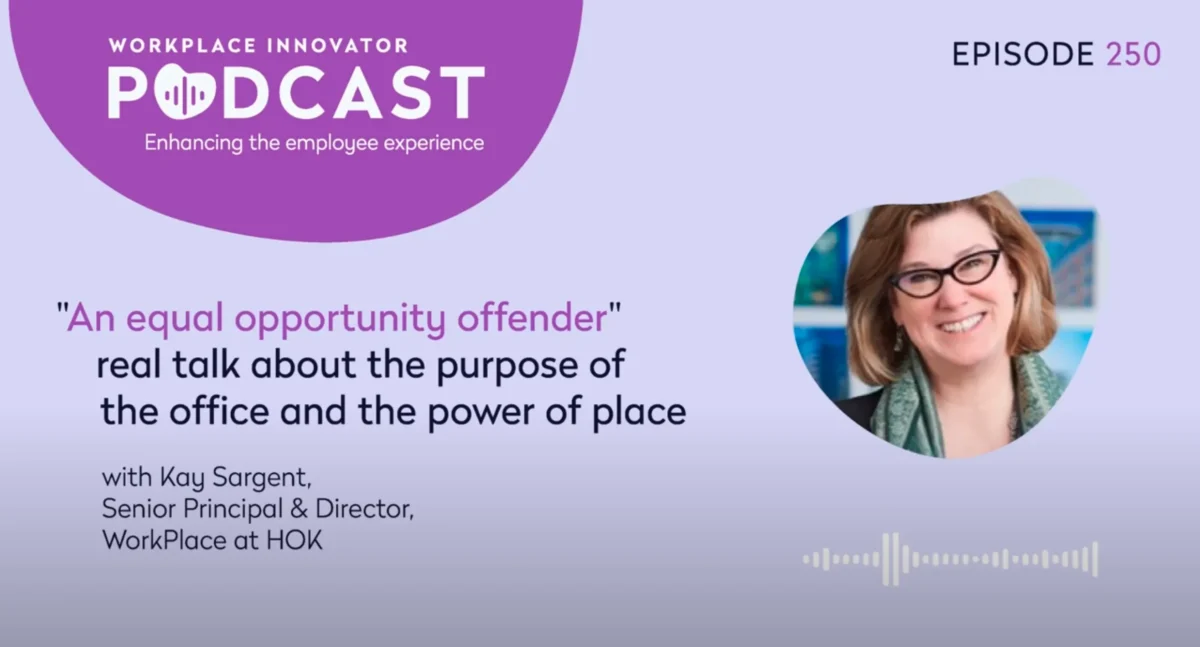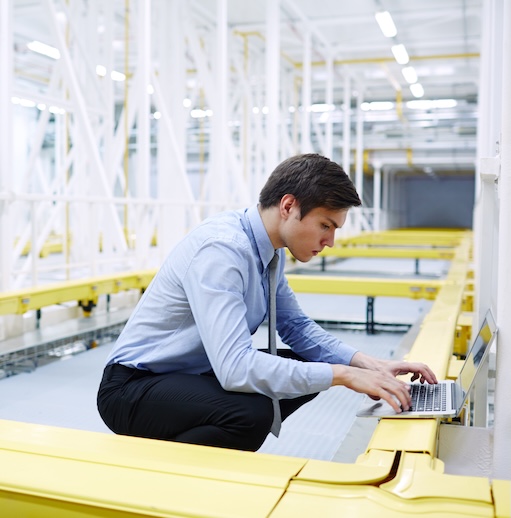
In episode 250 of Workplace Innovator, host Mike Petrusky speaks with Kay about the challenges and opportunities facing workplace leaders as they balance the needs of individuals while creating spaces and strategies that also build teams and a thriving culture. They revisit some of Kay’s past predictions, offer practical advice for facility management professionals, and discuss how future generations can be successful in the workplace.
Agenda
- Importance of flexibility in the workplace
- Office culture and the challenges of remote work
- Role of technology
- Understanding individual work styles and needs
- Potential pitfalls of overemphasizing gathering spaces in office design
- Facility management professionals in adapting to change
What you need to know: Workplace takeaways
Takeaway 1: The future of the workplace is about creating connections and providing choice
The future workplace will need to prioritize connections between employees and offer a range of choices for how and where work is done, according to Sergeant. She discussed the idea of ‘neighborhood-based choice’ workspaces, providing a sense of belonging and predictability while allowing workers to choose where they work based on their tasks and needs.
“Give people options and choices. Zone it appropriately. Create opportunities for people to get up and move to spaces. They don’t have to sit here; I’m not tethered and tied to this one spot, right? Get up and move,” said Sergeant. She also mentioned that the purpose of the office is going to be different things for different people. “For some people, it’s not safe for them to work at home, or they’re not able to; they don’t have the infrastructure, or they don’t have the discipline, or they don’t want to.”
She also stressed the importance of not overdoing gathering spaces. “I think we’re going to overdo gathering spaces. Everybody’s saying the only reason people are coming back is to gather, connect, and meet, so they’re gutting whole parts of buildings and creating these massive connections and gathering spaces. Now, I think that’s important, and I think when we come back, I think there’s going to be a focus on that because that’s what we’ve been denied, so now that’s what we’re going to seek actively. But over time, we’re going to need some balance.”
Takeaway 2: The importance of understanding the ‘why’ behind workplace design
According to the panelists, understanding the ‘why’ behind workplace design is crucial. If workplaces are designed without understanding the needs of their employees, the result can be spaces that do not serve their intended purpose.
“If we’re coming back to the office to sit on Zoom calls all day, that’s just horrible. And you know, I jokingly said the best thing that could happen to this country is Zoom goes down for a week, and all of a sudden everybody would snap out of that zombie apocalypse,” said Sergeant. She also emphasized the need to understand what kind of work people are doing. “The whole question about whether I should work remotely or not has far less to do with what you actually want and far more to do with what kind of job you have.”
It was pointed out that just because technology allows work to be done remotely, it isn’t necessarily the best solution. This calls for a holistic solution involving HR, IT, and FMs to address the complexities of the evolving work environment.
Takeaway 3: The role of technology in the future of the workplace
Sergeant discussed the role of technology in the future of the workplace, noting that while it can enable new ways of working, it is not the only factor to consider when designing workspaces.
She stated, “I think we’re going to be living with the social ramifications of COVID that are going to long outlive the medical ramifications of covid. I really believe that.” She also expressed concerns about over-reliance on technology, saying, “Just because you can do something doesn’t mean you should.”
The role of facilities management (FM) professionals was also discussed, with Sergeant emphasizing the need for FMs to shift away from space-centric measurements and towards human-centric ones. “Forever, our industry has been so focused on space-centric measurements that we really need to think about human-centric ones.” She also stressed the importance of FMs being open-minded and willing to rethink traditional workplace design and management approaches.
Workplace insights
- The workplace is evolving to be more flexible and adaptable, focusing on providing employees with options and choices.
- The 2020 global pandemic highlighted the challenges of remote work, including isolation and the lack of social interaction and mentorship opportunities.
- Technology is increasingly shaping the workplace, but there is a need to balance and consider individual work styles and needs.
- The risk of overemphasizing gathering spaces in office design could lead to noise and distraction issues.
- Facility management professionals have a pivotal role in adapting to these changes and ensuring the workplace meets the needs of employees.








